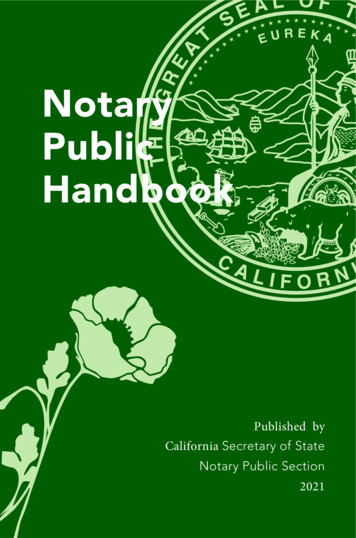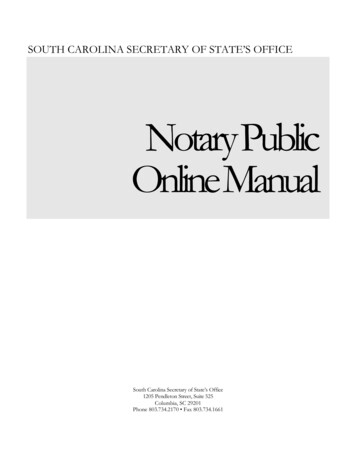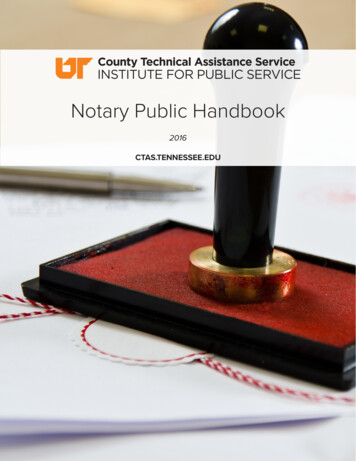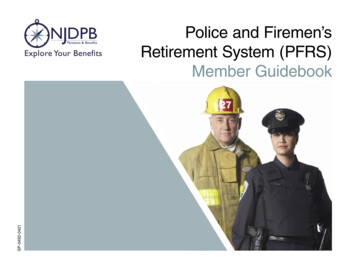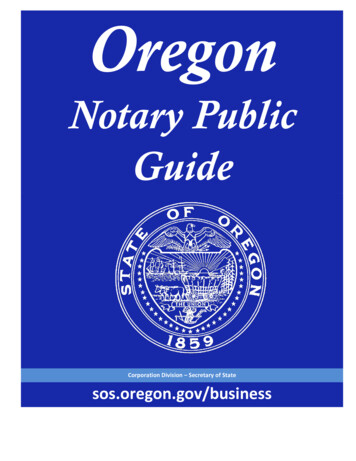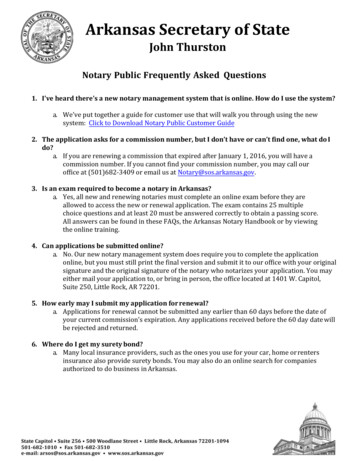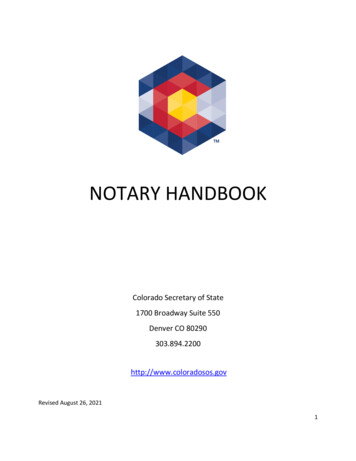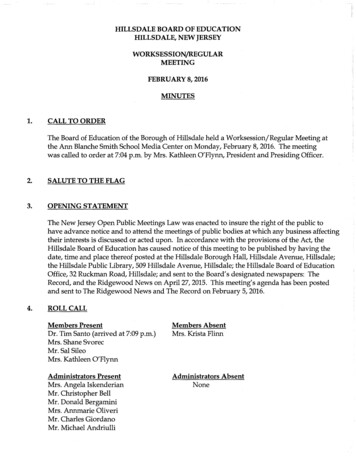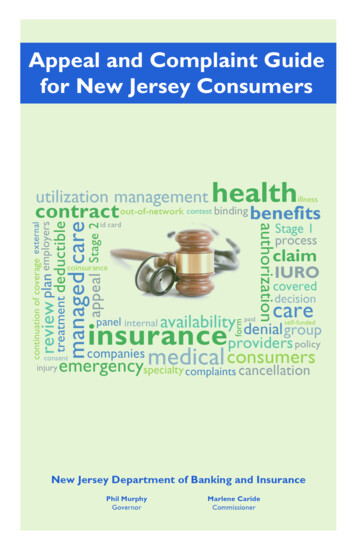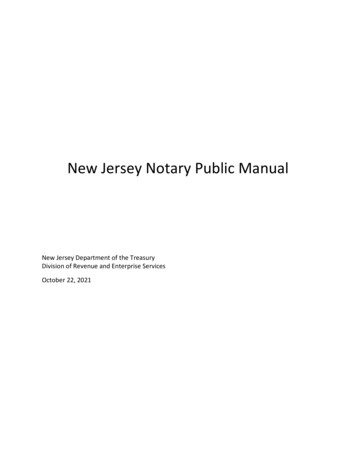
Transcription
New Jersey Notary Public ManualNew Jersey Department of the TreasuryDivision of Revenue and Enterprise ServicesOctober 22, 2021
FORWARDThe office of the notary public is a vital public function. Notaries public are called upon toperform many valuable services for New Jersey's business, legal and financial communities.Effective notary services help to ensure that documents are properly executed, that facts areduly certified, and above all, that the public is protected from fraud. Notarization is essential formany official documents including mortgages, deeds, contracts, and various corporatetransactions. This manual is designed to provide notaries public with practical guidance on howto perform notary services.By following the manual's guidelines, notaries public will operate on a structured proceduralfoundation and thereby help foster the levels of diligence and accuracy required for the ongoing success of the office. The Division of Revenue and Enterprise Service’s Business ServicesBureau serves as the administrative unit for the Notary Public program in New Jersey.Write to the Bureau via e-mail at mlor by mail at:NJ Division of Revenue of Revenue and Enterprise ServicesBusiness Services Bureau/Notary UnitPO Box 452Trenton, NJ 08646
ContentsCHAPTER 1. PURPOSE . 5CHAPTER 2. DEFINITIONS . 5CHAPTER 3. QUALIFICATIONS FOR OFFICE, SCOPE OF AUTHORITY AND PROHIBITED ACTS . 7Eligibility Criteria . 7Scope of Authority . 7Prohibitions . 7CHAPTER 4. NOTARY COMMISSIONING PROCESS . 7Application Procedures . 7Commissioning of Nonresidents, Additional Requirements . 9Name Change, Filing Evidence of Continuance of Powers and Privileges . 9CHAPTER 5. DENIAL, REVOCATION, SUSPENSION OR LIMITATION OF A COMMISSION . 10Reasons for Denial, Revocation, Suspension or Limitation . 10CHAPTER 6. GENERAL REQUIREMENTS FOR NOTARIAL ACTS . 11Certificates and Stamps . 11Requirement for Individuals Unable to Sign . 13Certificate Forms . 13Journal Requirement. 16CHAPTER 7. FORMS OF IDENTIFICATION AND COPY CERTIFICATION REQUIREMENTS. 17Copy Certification Requirements . 17Forms of Identification. 17CHAPTER 8. USE OF COMMUNICATION TECHNOLOGY . 18General Provisions and Definitions . 18Requirements for Notarial Acts Using Communication Technology . 19Taking an Acknowledgement When a Record is in the Possession of the Notary Public . 21Performing a Notarial Act When a Record is Not Physically Present Before the Notary Public. 21Date of Effectiveness . 22Administering Oaths to Remotely Located Individuals. 22Additional Certificate Wording . 22Retention of Audio-Visual Recordings . 22CHAPTER 9. ELECTRONIC NOTARIZATION. 22General Provisions and Definitions . 22Restriction Regarding Wills, Codicils and Testamentary Trusts. . 223
Requirements for Electronic Notarization . 22CHAPTER 10. RIGHT TO REFUSE TO PERFORM A NOTARIAL ACT . 23Criteria for Refusal . 23CHAPTER 11. FEES FOR NOTARIAL SERVICES . 23Fees for Services . 23RESOURCES . 25REFERENCES . 264
CHAPTER 1. PURPOSEThis manual is designed to implement the provisions of P.L. 2021, c.179 and N.J.A.C. 17:50. Therules streamline the commissioning process, clarify, and expand upon the requirements fornotarial acts, provide for the use of new technologies for notarization and enhance thetransparency and accountability of the office. In implementing these improvements, theDepartment of the Treasury intends to: foster improved notarial service levels State-wide; placeNew Jersey on a strong footing in the notarial practice space nationally; and bolster thereliability and integrity of New Jersey notarial practices in general. The ultimate beneficiaries ofthese advancements will be New Jersey citizens and the State’s business and legal communitiesthat rely on notarial services.Note: As outlined above, the focus of this document is on the commissioning process andnotarial practices. For more information on commercial and legal uses/acceptance of recordsnotarized by New Jersey notaries public, please consult the governing statute found /179 .PDF. Finally, note that the content ofthis manual does not constitute legal advice relative to the application of the law to specificlegal transactions.CHAPTER 2. DEFINITIONSThe following words and terms, when used in this Chapter, shall have the following meanings,unless the context clearly indicates otherwise.“Acknowledgment” means a declaration by an individual before a notarial officer that theindividual has signed a record for the purpose stated in the record and, if the record is signed ina representative capacity, that the individual signed the record with proper authority andsigned it as the act of the individual or entity identified in the record.“Electronic” means relating to technology having electrical, digital, magnetic, wireless, optical,electromagnetic, or similar capabilities.“Electronic signature” means an electronic symbol, sound, or process attached to, or logicallyassociated with, a record and executed or adopted by an individual with the intent to sign therecord.“In a representative capacity” means acting as:1. An authorized officer agent, partner, trustee, or other representative for a person otherthan an individual;2. A public officer, personal representative, guardian, or other representative, in thecapacity stated in a record;3. An agent or attorney-in-fact for a principal; or4. An authorized representative of another in any other capacity.5
“Non-attorney applicant” means an applicant for an initial or renewal commission as a notarypublic who is not also a licensed attorney-at-law in this State.“Notarial act” means an act, whether performed with respect to a tangible or electronic record,that a notarial officer may perform under the laws of New Jersey. The term includes:1.2.3.4.5.6.Taking an acknowledgment,Administering an oath or affirmation,Taking a verification on oath or affirmation,Witnessing or attesting a signature,Certifying or attesting a copy or deposition, andNoting a protest of a negotiable instrument.“Notarial officer” means a notary public or other individual authorized by law to perform anotarial act.“Notary public” means an individual commissioned by the State Treasurer to perform a notarialact.“Official stamp” means a physical image affixed to or embossed on a tangible record or anelectronic image attached to, or logically associated with, an electronic record.“Person” has the meaning ascribed to it in N.J.S.A. 1:1-2:“Record” means information that is inscribed on a tangible medium or that is stored in anelectronic or other medium and is retrievable in perceivable form.“Sign” means, with present intent to authenticate or adopt a record:1. To execute or adopt a tangible symbol; or2. To attach to or logically associate with the record an electronic symbol, sound, orprocess.“Signature” means a tangible symbol or an electronic signature that evidences the signing of arecord.“Stamping device” means:1. A physical device capable of affixing to or embossing on a tangible record an officialstamp; or2. An electronic device or process capable of attaching to or logically associating with anelectronic record an official stamp.6
“State” means the State of New Jersey; “other state” or “another state” means any state, theDistrict of Columbia, the Commonwealth of Puerto Rico, the United States Virgin Islands, andany other insular possession or territory of the United States other than the State of NewJersey.“Verification on oath or affirmation” means a declaration, made by an individual on oath oraffirmation before a notarial officer, that a statement in a record is true.CHAPTER 3. QUALIFICATIONS FOR OFFICE, SCOPE OF AUTHORITY AND PROHIBITED ACTSEligibility CriteriaA person commissioned as a notary public in this State shall be at the time of appointment:1. Be at least 18 years of age;2. Be a legal resident of this State or have a place of employment or practice in this State;and3. Not be disqualified to receive a commission under Chapter 5 (CHAPTER 5. Denial,Revocation, Suspension or Limitation of a Commission).Scope of AuthorityA notary public who has been duly commissioned and qualified is authorized to perform theduties of a notary public throughout the State.ProhibitionsA notarial officer may not perform a notarial act with respect to a record to which the officer orthe officer’s spouse or civil union partner is a party, or in which either of them has a directbeneficial interest. An act that violates this provision is voidable.A notary public who is not licensed as an attorney-at-law shall not use or advertise the title oflawyer or attorney-at-law, or equivalent terms, in any other language, which mean or implythat the notary public is licensed as an attorney-at-law in the State of New Jersey or in anyother jurisdiction of the United States.A notary public who advertises their services in any language is required to provide with suchadvertisement a notice which contains the following statement or translation of the followingstatement if the advertisement is not in English: "I am not an attorney licensed to practice lawand may not give legal advice about immigration or any other legal matter or accept fees forlegal advice."CHAPTER 4. NOTARY COMMISSIONING PROCESSApplication ProceduresAn applicant for commission as a notary public shall make application to the State Treasurer ona form prescribed by the State Treasurer and endorsed by a member of the Legislature.7
Renewals shall be made in the same manner as the original application. All applications shall besubmitted electronically through a means provided by the State Treasurer at www.nj.gov/njbgs.The fee for each application for a commission is 25.00 and is non-refundable.Initial Commission. (NOTE: The educational and testing requirements for initial commissionsbecome effective in July 2022) A non-attorney applicant for an initial commission as a notarypublic shall provide satisfactory proof that the applicant has:1. Completed a six-hour course of study approved by the State Treasurer; and2. Passed an examination prescribed by the State Treasurer.The State Treasurer may charge up to a 15.00 fee for each test administered online.The Treasurer shall set forth the procedures for compliance with the above provisions andprovide certificates of approval evidencing completion of the required education and testingonline at www.nj.gov/njbgs.Renewed Commission. (NOTE: The educational requirement for renewed commissionsbecomes effective in July 2022) A commissioned notary public applying to renew a commissionwho has satisfactorily completed the six-hour course of study and passed an examinationprescribed by the State Treasurer at least one time, or who was commissioned for the first timebefore the effective date of P.L. 2021, c.179, shall complete a three-hour continuing educationcourse. The Treasurer shall set forth the procedures for compliance with this provision andprovide certificates of approval evidencing completion of the required education and testingonline at www.nj.gov/njbgs.Swearing in. Within three months of the receipt of an initial or renewed commission, eachnotary public shall take and subscribe an oath before the clerk of the county in which thenotary public resides to faithfully and honestly discharge the duties of the office and make andkeep a true record of all such matters as are required by law. The oath shall be filed with saidclerk.The oath of office of a nonresident notary public shall be taken and subscribed before the clerkof the county in which the nonresident notary public maintains the notary public’s office or thecounty in which the nonresident notary public is an employee of a business with its domicile orprimary place of business in this State.Upon the administration of the oath, the clerk shall cause the notary public to endorse thecertificate of commission and qualification and shall transmit the certificate to the StateTreasurer within 10 days of the administration of the oath, via an electronic method providedby the Treasurer.8
After the administration of the oath, the clerk shall provide a notice to the person that a notarypublic who is not licensed as an attorney-at-law shall not use or advertise the title of lawyer orattorney-at-law, or equivalent terms, in any language, which mean or imply that the notarypublic is licensed as an attorney-at-law in the State of New Jersey or in any other jurisdiction ofthe United States. The notice shall also state that a notary public who advertises the notarypublic’s services in any language, is required to provide with such advertisement a notice in thelanguage of the advertisement which contains the following statement or translation of thefollowing statement if the advertisement is not in English:"I am not an attorney licensed to practice law and may not give legal advice aboutimmigration or any other legal matter or accept fees for legal advice."The State Treasurer shall cancel and revoke the appointment of any notary public who fails totake and subscribe the oath within three months of the receipt of the commission and anyappointment so canceled and revoked shall be null, void and of no effect.Commissioning of Nonresidents, Additional RequirementsA person who is not a legal resident of the State of New Jersey, but maintains, or is regularlyemployed in, an office in this State or is an employee of a business with its domicile or primaryplace of business in this State and performs his employment duties remotely from a homeoffice or a co-working space may apply for a commission by complying with the ApplicationProcedures of this Chapter and certifying the following additional information via the onlinecommissioning site at www.nj.gov/njbgs:1. The residence and the address of the applicant, and the office or place of employmentof the applicant in this State; and2. Once commissioned, any such nonresident notary public shall file online with the StateTreasurer at www.nj.gov/njbgs a certificate showing any change of residence or changeof the office or place of employment of the notary public in this State.Name Change, Filing Evidence of Continuance of Powers and PrivilegesIf a notary public adopts a name different from that which the notary public used at the timethe notary public was commissioned, before the notary public provides a signature to anyrecord which the notary public is authorized or required to sign as notary public, the notarypublic shall make, sign and file a statement in writing and under oath, on a form prescribed andfurnished online at www.nj.gov/njbgs by the State Treasurer, setting out the circumstancesunder which the notary public has adopted the new name.The statement shall indicate whether the new name has been adopted through marriage orcivil union or by a change of name proceeding or otherwise, and such other information as theState Treasurer shall require. Such statement shall be evidence of the right of the notary publicto continue to exercise the powers and privileges and perform the duties of a notary public inthe changed or new name.9
CHAPTER 5. DENIAL, REVOCATION, SUSPENSION OR LIMITATION OF A COMMISSIONReasons for Denial, Revocation, Suspension or Limitation(a) The State Treasurer may deny an application for a new or renewed notary publiccommission, or suspend, revoke, or otherwise limit the commission of a notary public forany act or omission that demonstrates the individual lacks the honesty, integrity,competence, or reliability necessary to act as a notary public. These acts and omissioninclude:1. Failure to comply with P.L. 2021, c. 179 (N.J.S.A. 52:7-10 et seq.);2. A fraudulent, dishonest, or deceitful misstatement or omission in the application forcommission as a notary public submitted to the State Treasurer;3. A finding against, or admission of liability by, the applicant or notary public in any legalproceeding or disciplinary action based on fraud, dishonesty, or deceit, including but notlimited to a violation of section 1 of P.L.1997, c.1 (N.J.S.A. 2C:21-31) or section 1 ofP.L.1994, c.47 (N.J.S.A. 2C:21-22), but nothing in this paragraph shall be deemed tosupersede P.L.1968, c.282 (N.J.S.A. 2A:168A-1 et seq.);4. A conviction of a crime of the second degree or above, but nothing in this paragraphshall be deemed to supersede P.L.1968, 21 c.282 (N.J.S.A.2A:168A-1 et seq.);5. Failure by the notary public to discharge any duty required by any law, including P.L.2021, c.179 (N.J.S.A. 52:7-10 et seq.), any rules or regulations promulgated thereunderby the State Treasurer, and any other State or federal law;6. Use of false or misleading advertising or representation by the notary public representingthat the notary is commissioned, licensed, or authorized to practice or engage in workthat the notary is not commissioned, licensed, or authorized to engage in;7. In the case of a notary public who is not an attorney licensed to practice law, any of thefollowing:i. Giving legal advice;ii. Acting as an immigration consultant or an expert on immigration matters;iii. Otherwise performing the duties of an attorney licensed to practice law in NewJersey;iv. A disciplinary or other administrative action resulting in a finding of culpability ifthe applicant holds any professional license regulated by the State; orv. Creating or reinforcing, by any means, a false impression that the person islicensed to engage in the practice of law in this State or any other state,including, but not limited to, committing a violation of P.L.1994, c.47 (N.J.S.A.2C:21-22) or P.L.1997, 44 c.1 (N.J.S.A. 2C:21-31);8. Failure to take and subscribe to the oath pursuant to P.L. 2021, c.179 (N.J.S.A. 52:7 et.seq.) within three months of the receipt of a notary public commission;9. Withholding access to or possession of an original record or photocopy provided by aperson who seeks performance of a notarial act by the notary public, except if allowed10
by law; or10. The denial of an application for notary public in another state; the refusal to renew inanother state; or the suspension, revocation, or other limitation of the commission ofthe notary public in another state.(b) When the State Treasurer determines to deny an application for notary public; refuses torenew a commission of a notary public; or suspends, revokes, or otherwise limits thecommission of a notary public, the Treasurer shall provide written notice to the applicant orcommissioner holder.(c) The written notice shall include:1. The name, email address, and telephone number of a contact person at theDivision of Revenue and Enterprise Services and a description of the proposedaction.2. The specific details concerning the violations that are the basis for thedetermination.3. Notification that the person can request a hearing by submitting the request inwriting to the name and address provided on the notice. The request for ahearing must be received within 20 calendar days from the date the personreceived the notice of the proposed action.4. The request for a fair hearing must include a detailed statement of the reasonsthat the person believes the Treasurer’s determination is improper together withsupporting documentation, if any. It should also include a statement as towhether the person is represented by legal counsel, and if so, the name, addressand telephone number of counsel.(d) Upon the Division’s timely receipt of the items set forth in (c) above, it shall determinewhether a contested case exists, and if it does, the Division shall transmit the matter to theOffice of Administrative Law for hearing as a contested case.(e) If the person has either failed to file a timely appeal or has expressly waived its right toappeal, the decision shall become a final decision.(f) All hearings pursuant to this section shall be conducted in accordance with theAdministrative Procedure Act, N.J.S.A. 52:14B-1 et seq., and the Uniform AdministrativeProcedure Rules, N.J.A.C. 1:1.(g) Any appeal of the final agency decision shall be solely to the Appellate Division of theSuperior Court within time limits allowed by New Jersey Court Rule 2:2-3. The final agencydecision shall include notice to the appellant of the right to file an appeal to the AppellateDivision, the time frames and related procedures.CHAPTER 6. GENERAL REQUIREMENTS FOR NOTARIAL ACTSCertificates and StampsAll notarial acts shall be evidenced by a certificate and be stamped by the notary public.Certificates shall:1. Be executed contemporaneously with the performance of the notarial act;2. Be signed and dated by the notarial officer;11
3. Identify the jurisdiction in which the notarial act is performed;4. Contain the title of office of the notarial officer; and5. If the notarial officer is a notary public, indicate the date of expiration of the officer’scommission.A certificate of a notarial act is sufficient if it meets the requirements outlined in the precedingsection and:1. Is in a short form set forth in this Chapter;2. Is in a form otherwise permitted by the law of this State; and3. Is in a form permitted by the law applicable in the jurisdiction in which the notarial actwas performed.A notarial officer may not affix the officer’s signature to, or logically associate it with, acertificate until the notarial act has been performed.If a notarial act regarding a tangible record is performed, a certificate shall be part of, orattached to, the record.If a notarial act regarding an electronic record is performed, the certificate shall be affixed to, orlogically associated with, the electronic record.The official stamp of a notary public shall:1. Include the name of the notary public, the title “Notary Public, State of New Jersey,” andthe notary public’s commission expiration date; and2. Be capable of being copied together with the record to which it is affixed or attached orwith which it is logically associated.If a notarial act regarding a tangible record is performed by a notary public, an official stampshall be affixed to or embossed on the certificate near the signature of the notary public to beclear and readable.If a notarial act regarding an electronic record is performed by a notary public, an official stampmust be attached to or logically associated with the certificate.A notary public is responsible for the security of the stamping device used by the notary publicand may not allow another individual to use the device to perform a notarial act, except at thespecific instruction of a notary public who cannot physically use the stamping device.The stamping device is the property of the notary public and not of the notary public’semployer, even if the employer paid for the stamping device.12
If the stamping device used by the notary public is lost or stolen, the notary public or the notarypublic’s personal representative shall notify the State Treasurer html of the loss or theft within 10 calendardays.Requirement for Individuals Unable to SignIf an individual is physically unable to sign a record, the individual may direct an individual otherthan the notarial officer to sign the record with the individual’s name. The notarial officer shallinsert “Signature affixed by (name of other individual) at the direction of (name of individual)”or words of similar import.Certificate FormsThe following short form certificates of notarial acts are sufficient for the purposes indicated ifthe requirements of this Chapter are satisfied.1. For an acknowledgment in an individual capacity:State ofCounty ofThis record was acknowledged before me on (date) by(Name(s) of individual(s))Signature of notarial officer13
StampName of Notary PublicNotary Public, State of New Jersey Title of officeMy commission expires (date)2. For an acknowledgment in a representative capacity:State ofCounty ofThis record was acknowledged before me on (date) by(Name(s) of individual(s))On (date)As (type of authority, such as officer or trustee) of (name of party onbehalf of whom record was executed).Signature of notarial officerStampName of Notary PublicNotary Public, State of New Jersey Title of officeMy commission expires (date)3. For a verification on oath or affirmation:State ofCounty ofSigned and sworn to (or affirmed) before me on (date) by(Name(s) of individual(s) making statement)14
Signature of notarial officerStampName of Notary PublicNotary Public, State of New Jersey Title of officeMy commission expires (date)4. For witnessing or attesting a signature:State ofCounty ofSigned (or attested) before me on (date)(Name(s) of individual(s))Signature of notarial officerStampName of Notary PublicNotary Public, State of New Jersey Title of officeMy commission expires (date)5. For certifying a copy of a record:State ofCounty ofI certify that this is a true and correct copy of a record in the possession of(name).Dated (date)15
Signature of notarial officerStampName of Notary PublicNotary Public, State of New Jersey Title of officeMy commission expires (date)Journal RequirementA notary public shall maintain a journal of all notarial acts performed.1. The journal may be created and maintained on a tangible medium or in an electronicformat.2. A notary public shall maintain only one journal at a time to chronicle all notarial acts,whether those notarial acts are performed regarding tangible or electronic records.3. If the journal is maintained on a tangible medium, it shall be a permanent, boundregister with consecutively numbered lines and consecutively numbered pages.4. If the journal is maintained in an electronic format, it shall be in a permanent, tamperevident electronic format.For each notarial act, the notary public shall record in the journal:1. The date and time of the notarial act;2. The type of notarial act, including but not limited to the taking of an acknowledgment,the taking of a proof of a deed, the administration of an oath, or the taking of anaffidavit;3. The name and address of each person for whom the notarial act is performed;4. If the identity of the individual is based on personal knowledge, a statement to thateffect;5. If the identity of the individual is based on satisfactory evidence, a brief description
A notary public who is not licensed as an attorney-at-law shall not use or advertise the title of lawyer or attorney-at-law, or equivalent terms, in any other language, which mean or imply that the notary public is licensed as an attorney-at-law in the State of New Jersey or in any other jurisdiction of the United States.

